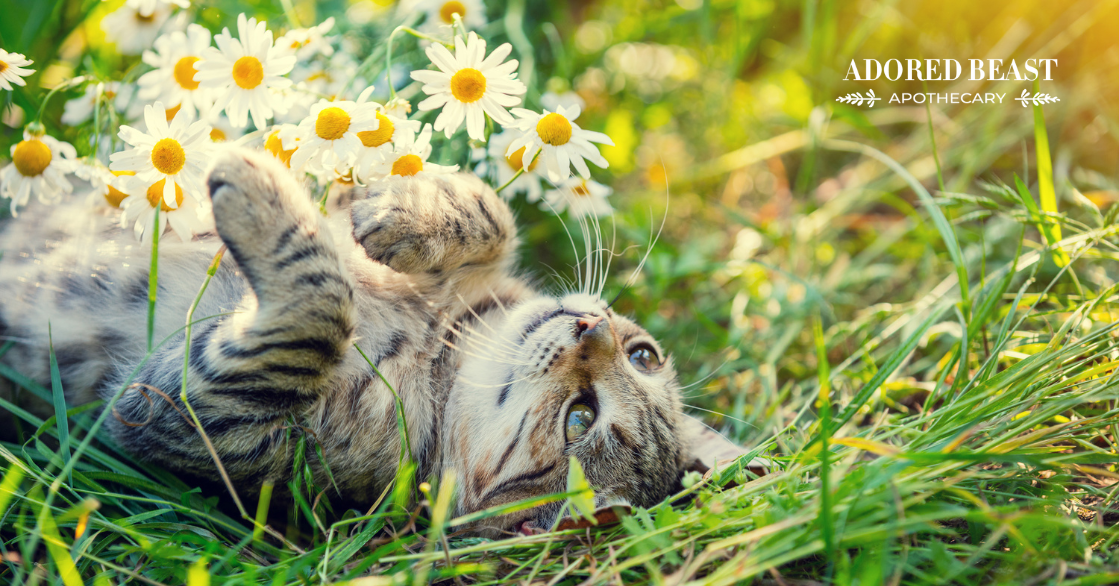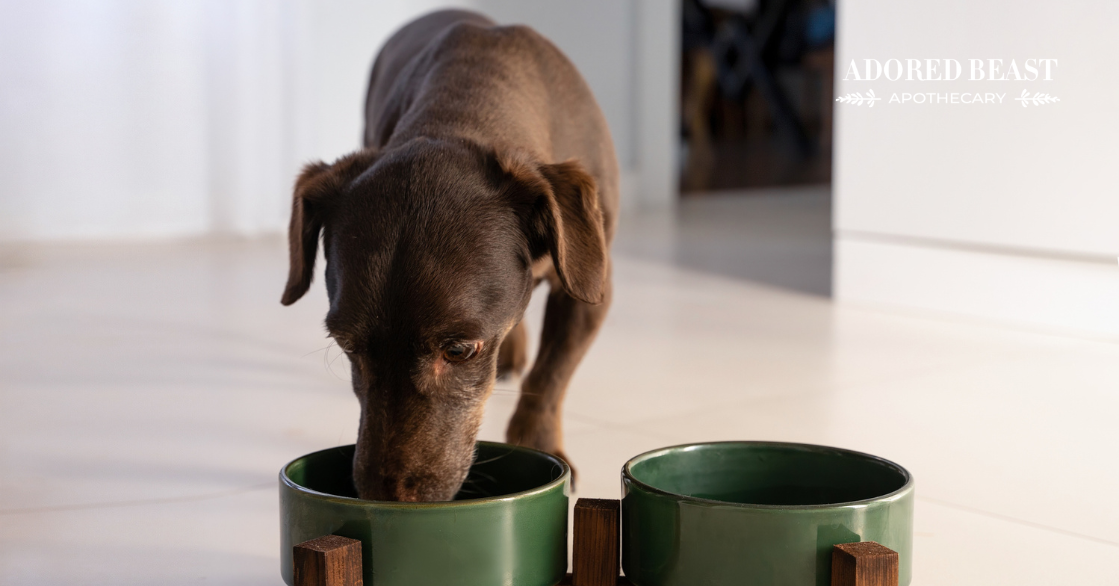Last week we put out a blog on chamomile for our canine friends. We talked about all the ways it can be valuable for dogs, and how to use it.
We also promised to write another post specifically for our feline friends.
So, that’s what we’re doing today – covering the benefits of chamomile for cats and how to use it!
Chamomile 101
In case you missed it last week, chamomile is a plant in the family Asteraceae. You probably recognize it as the common daisy. In herbal healing, Roman chamomile and German chamomile are the go-to varieties. The plant has a long history when it comes to plant therapies, and its use goes back to ancient Greece, Rome, and Egypt.
Originally herbal healers recommended it for a whole host of ailments, including sore throats and coats, burns, anxiety, insomnia, stomach ulcers, even acne and psoriasis. And you might notice that it is still used for many of these!
And that’s all thanks to the many beneficial properties found in the plant. The various terpenoids and flavonoids contribute to these properties, which include:
- anti-inflammatory
- anti-anxiety
- anti-microbial
- antispasmodic
- antioxidant
With a resume like that, it should come as no surprise that we celebrate chamomile for cats!
Using Chamomile for Cats
Chamomile has a strong affinity for the skin, digestive tract, liver, nervous system, mucous membranes, and smooth muscle tissues. As you can imagine, that makes for some pretty impressive benefits!
But let’s start with this: Because cats metabolize chamomile differently than dogs, we recommend starting really low, and working up very slowly. Stick to small amounts, always. Also, we only use it when needed, never long term.
Well known herbalist Greg Tilford, in his book Herbs for Pets: A Natural Way to Enhance Your Pet’s Life, says “Both German and Roman chamomiles share a nearly identical range of therapeutic usefulness, but German chamomile is by far the more popular medicine because it has received much more research attention and has long been regarded by herbalists as a more potent medicine than Roman chamomile.”
Just as with dogs, we recommend testing a tiny amount on the skin before using it to determine if your cat is allergic to it. (If you know of an existing daisy allergy, please don’t use chamomile.) To do this, steep a cup of chamomile tea, let it cool, the put a few drops on the skin in an easy-to-see area (the tummy works best in most cases).
If you notice any skin irritation, vomiting, diarrhea, or allergic reactions (sneezing, welts, hives), don’t use chamomile for your kitty.
If you don’t notice any reaction, give just a drop or two and watch for any changes, then you know you can move ahead safely.
The Benefits of Chamomile for Cats
These are some of the things we use it for, and how to use it:
- Anxiety – chamomile is well known as a sleep aid, and if your cat is anxious or not sleeping well, chamomile might be a good choice. Use internally, or use homeopathic chamomile!
- Digestive upset – because of its soothing, anti-inflammatory properties, chamomile can help calm an upset tummy. This includes vomiting, diarrhea, indigestion, loss of appetite, even gas. Use internally.
- Skin irritations – if your cat has a rash, a wound, a burn, or has been itching a lot, chamomile can help calm the irritated skin and relive the itch. Use externally.
- Respiratory issues – things like asthma, bronchitis, and allergies can also be helped with chamomile. It helps to reduce inflammation in the airways and throat, which can help to relieve coughing and sneezing. Use with a vapourizer.
- Irritable Bowel Syndrome (IBS) – Chamomile can be helpful for cats with IBS because it helps reduce inflammation in the digestive tract and provides relief from symptoms like pain, bloating, constipation, and diarrhea. Use internally.
It has also been shown to help with muscles spasms and tension, inflammation, to bring down a fever, even to relax the nervous system.
Internal Use: A chamomile tincture directly in the mouth, or added to food, or some chamomile tea on its own or with food are all ways to use it internally.
- Tincture: 0.25 – 0.5mls per 20lbs of bodyweight, 1-2 times daily, as needed.
- Cooled tea: 2-3 drops twice daily directly in the mouth or mixed with food.
External Use: We love chamomile tea for external use. Steep some chamomile tea and let it cool. You can then apply the cooled tea bag directly on the affected area, or use a piece of gauze or organic cotton. Hold it in place for a few minutes, then let it dry.
With a Vapourizer: Add a few drops of chamomile extract to your vapourizer for inhalation. Remember, the larger the room, the less that will be inhaled, and thus the less effective the vapour will be.
A Few Cautions
As mentioned, always test a small area on your cat to make sure there are no allergies.
Additionally, as with any herb, when using internally it’s best to give your cat a small amount first and then increase the amount gradually over time.
Are there any drug interactions you should be aware of? Use caution with chamomile if your cat is on any of the following medications: warfarin, NSAIDs, or any sedatives.
While chamomile tea or tinctures are generally safe, we don’t want our cats sitting on the windowsill munching away on a chamomile plant. Certain parts of the chamomile plant are potentially dangerous for cats, so you want to make sure that you’re controlling the access to this herb.
And, as always, if you have any concerns, or want to start using chamomile for cats but are unsure about how to proceed, speak to your trusted veterinarian or feline herbalist!
Chamomile for cats is a wonderful healing herb that can be used for so many different things with our animals (and ourselves of course). Thanks again to Mother Nature for providing us with the perfect resources!












